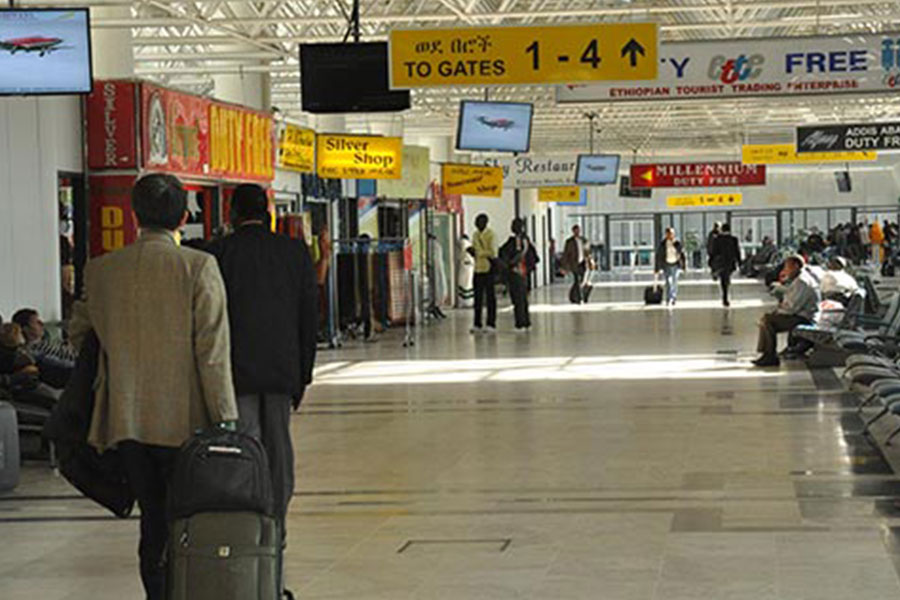
Radar |
It was thought to be less of the usual hustle and bustle as Gebremeskel Chala, minister of Trade & Regional Integration (MoTRI), pledged transformed services when the online trade registration and licensing launched last year. His deputies aspired to see the digital portal offer ease to businesses that have had to jump through a slew of bureaucratic hoops to obtain and renew trade licenses.
They had hoped to cut down in-person visits to the Ministry. The Ministry’s headquarters on Marshal Tito Street made it evident that the digitisation has yet to work out as the authorities had hoped. The first floor of the nine-storey building was overwrought, crammed with business owners or representatives. Many complained about the hassle they had been through.
Amid the disquiet, Moges Feye had heated exchanges with an officer of the Ministry.
It was the third day he was in the building, desperately trying to find someone to help. Moges works as a corporate manager for Pittards Ethiopia, a leather products manufacturer. The UK-based company acquired a tannery operating in Modjo town two decades ago. It had supplied the tannery with chemicals in the many preceding years. A decade ago, Pittards expanded its operation, opening another plant in Addis Abeba with a daily capacity to process 12,000 pieces of sheepskin and 1,000 hides.
Moges was delighted to hear that the Ministry was digitising its services. Expecting to cut down on the days required to renew a business license, he uploaded all the required documents online a week ago. Uploading a tax clearance document and financial statements was not as easy.
Ahmed Adem, the Ministry’s officer, told Moges to check with experts in the IT department. Moges was one of the few Ahmed sent to the sixth floor. At least 10 people were waiting to talk to the tech guys.
“It’s not supposed to be complicated,” said Moges, with an exacerbated tone.
Dubbed “ETRADE”, the portal was deployed in December as a pilot project. Last month, the Ministry made the digital registration and renewal services mandatory.
The portal was installed a decade ago after it was developed by Custor Computing Plc, a local firm established in 1993, for one million Birr. However, the portal was limited to an alternative for the Ministry’s documentation and filing work. Business owners were still required to process applications on paper. It was a legacy of the bureaucratic state.
Four years ago, though, the authorities decided to automate the process fully. Custor Computing was selected for the job for eight million Birr.
The upgraded version offers companies 13 different services. Applicants can apply for or renew licenses virtually. They can also check on the status of their applications, entering tax identification numbers (TIN). Trade officials cut down the number of procedures from 11 to five. Requirements such as publishing trade names in newspapers, authentication and confirmation for a memorandum of association, and submitting lease or rental agreements were scrapped.
“These were an unnecessary burden on businesses,” said Amelework Muhe, director of business registration and licensing.
Officials also cut the number of business categories required to present certificates of competency to acquire a trade license to 10. The rules had previously applied to no less than 52 lines of businesses. It is now limited to medical equipment, food, and chemical product importers. Meat processors, animal feed producers, contractors, and consultants are also beholden to the rule.
This has begun to pay off as the number of licenses issued and renewed has been climbing, disclosed Amelework. Over 46,000 businesses have processed their application through the portal beginning last month, disclosed the Director. Businesses pay 102 Br to renew a trade license; delinquent applications face penalties of 1,000 Br, with 1,500 Br top up monthly.
Still, the number of applications processed digitally pales compared to the size done at the Ministry. There are over one million of them. Business owners say the process remains challenging. A sketchy internet connection at the Ministry was a cause for the delay in Moges’ application process. The connection was out for most of the week, Ahmed told Fortune.
“We’re using Wi-Fi to access the system,” he said.
Technicians from the state-owned Ethio telecom were on the ground last week. They were busy fixing an erratic network.
Users like Mogus experienced that navigating the portal is “not user-friendly,” recurrent complaints designers say “expected” considering the recent introduction. Inadequate computer literacy was among the factors Ministry officials considered before launching the portal as a pilot project. They developed a scheme to train personnel at internet cafes.
“Training is needed to get users better accustomed to the portal,” said Gebreselassie Amha, Custor Computing’s general manager.
The arrival of the digital platform serves as a new revenue stream for these cafes. Operators from 21 cafes have thus far received the training. Those in the business say it has not yet made much of a dent but value its potential.
Zerihun Abu owns an internet cafe in the Piazza area. He is among the individuals working with the Ministry after receiving the training six months ago. A quarter of the two dozen customers he serves daily come to the cafe to process trade license applications.
“It’s becoming a growing source of income for me,” he told Fortune.
The cafes charge up to 200 Br as a service fee, including printing and scanning costs.
Officials at regional trade bureaus also took part in Ministry training programmes. The portal integrates 95pc of over 1,000 offices across the country with the mandate to carry out business registration and license renewal services. Among these is the Addis Abeba Trade Bureau, which has also begun providing services digitally. The Bureau started modernising its service delivery four years ago after launching an online application portal. Its officials hoped to see it ease processes for acquiring certificates of competency, registration and licensing.
Since the pilot programme was launched six months ago, nearly 8,000 businesses have used the digital platform. The Bureau processes over 330,000 business permits annually.
Despite the digitisation drive, businesses face lengthy and frustrating procedures. The complications are added to challenges in accessing credit and finding land or workspace.
Assefa Beyene recently witnessed firsthand the difficulties in applying for a trade license.
An engineer by training, he worked in the construction industry for two decades before deciding to open his consultancy firm last year. Getting a tax identification number (TIN) and a certificate of competency was relatively quick, if not straightforward, for him.
Assefa had to visit the Ministry of Revenues, where officials demanded he present an office lease agreement or proof of ownership before they could issue him a TIN.
They attribute the requirement to keep track of the whereabouts of the tax registration machines companies are required to install before beginning business. According to Tesfaye Terefa, a team leader in the Addis Abeba Small Taxpayers Branch Office of the Ministry on Sierra Leone Street (in the Beqlo Bet area), there are justifiable reasons for introducing the requirements. The Ministry notified 631 companies whose whereabouts have remained “unknown” for three years.
The amount of tax these businesses owe the state is a mystery as authorities have no way of determining their annual turnover.
Tesfaye says it takes no longer than half an hour to obtain a TIN if there are no issues. However, the period can stretch to days when there are.
Zenebech Demisse, a customer relations officer at the Medium Taxpayers Branch Office in the Stadium area, says the delays are often due to applicants failing to complete the documents. However, she concedes the portal is prone to occasional crashes.
Although digitisation can improve efficiency, efforts are wasted without an integrated service delivery system. Experts caution that disconnected efforts at digitisation across government agencies and offices would do little to achieve efficiency.
“When public institutions launch digital platforms independently, it won’t offer relief to businesses that have had to jump through bureaucratic hoops,” said Arega Shumetie (PhD), a senior researcher at the Ethiopian Economics Association.
Officials at the Ministry of Innovation & Technology are undertaking a “digital foundations project” to boost Ethiopia’s competitiveness in the digital sector through the inclusion and affordability of digital services. Financed with 200 million dollars in credit from the World Bank, the five-year project looks to support the digitalisation of public services, including integrating federal offices.
Two years ago, the Ministry launched a government electronics service portal. Twenty-five public institutions provide 319 services through the portal. Close to 300,000 applications had been processed by last week.
Custor Computing Plc is working on merging digital platforms operated by the Trade and Revenues ministries with the Document Authentication & Registration Agency.
“It’ll be completed in the next four months,” Gebreselassie said.
For Moges, the initiatives are inconsequential. His hopes that the renewal process would be more straightforward this time around were crushed last week. Whether the same will hold true next year is anyone’s guess.
PUBLISHED ON
Aug 20,2022 [ VOL
23 , NO
1164]

Radar |

Fortune News | Dec 02,2023

Radar | May 07,2022

Fortune News | Dec 17,2022

Radar | Mar 11,2023

Radar | Jan 28,2023

Agenda | Dec 11,2021

Radar | Apr 24,2023

Viewpoints | May 11,2023

Radar | Sep 08,2019

Dec 22 , 2024 . By TIZITA SHEWAFERAW
Charged with transforming colossal state-owned enterprises into modern and competitiv...

Aug 18 , 2024 . By AKSAH ITALO
Although predictable Yonas Zerihun's job in the ride-hailing service is not immune to...

Jul 28 , 2024 . By TIZITA SHEWAFERAW
Unhabitual, perhaps too many, Samuel Gebreyohannes, 38, used to occasionally enjoy a couple of beers at breakfast. However, he recently swit...

Jul 13 , 2024 . By AKSAH ITALO
Investors who rely on tractors, trucks, and field vehicles for commuting, transporting commodities, and f...

Oct 11 , 2025
Ladislas Farago, a roving Associated Press (AP) correspondent, arrived in Ethiopia in...

Oct 4 , 2025
Eyob Tekalegn (PhD) had been in the Governor's chair for only weeks when, on Septembe...

Sep 27 , 2025
Four years into an experiment with “shock therapy” in education, the national moo...

Sep 20 , 2025
Getachew Reda's return to the national stage was always going to stir attention. Once...